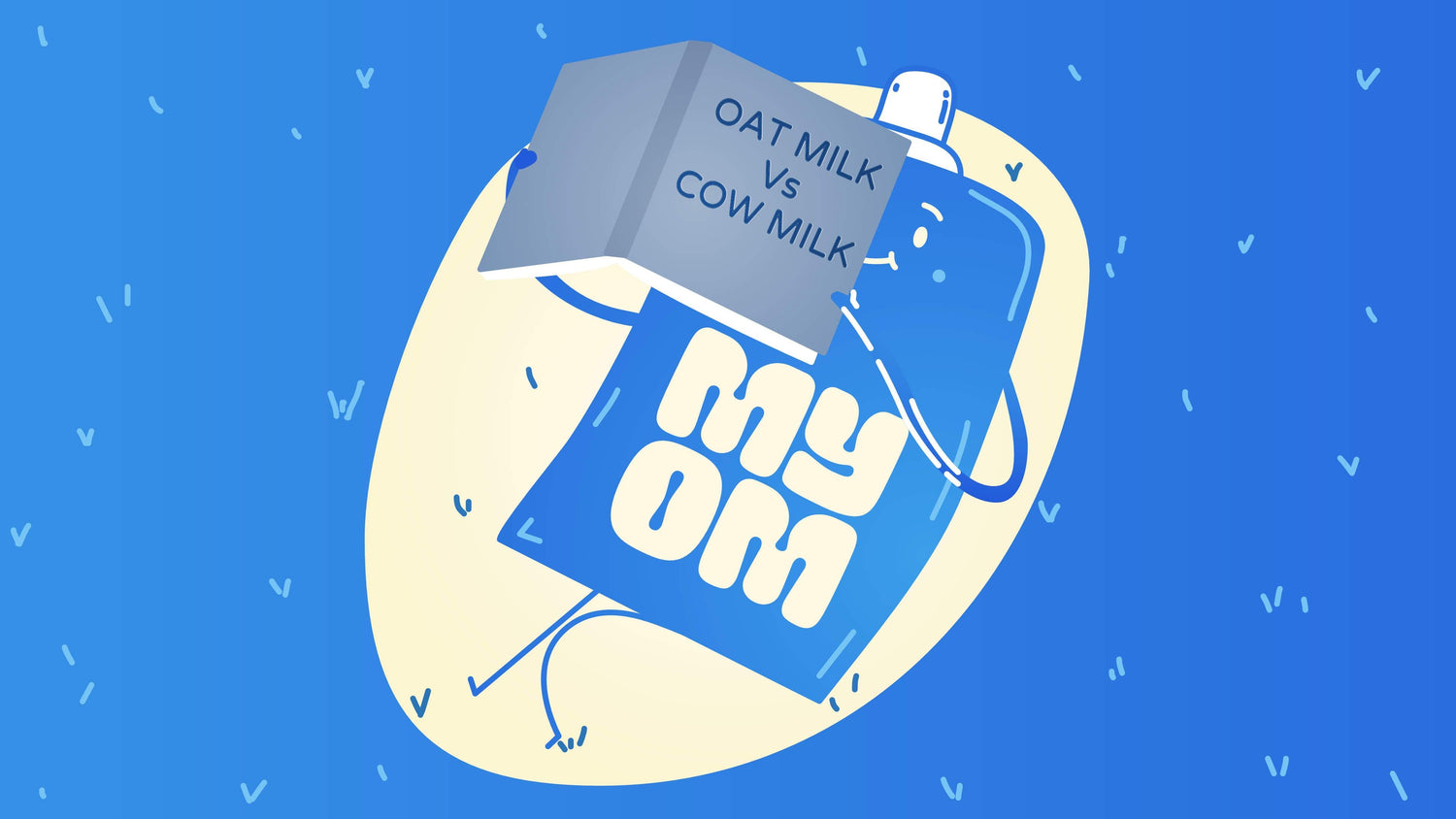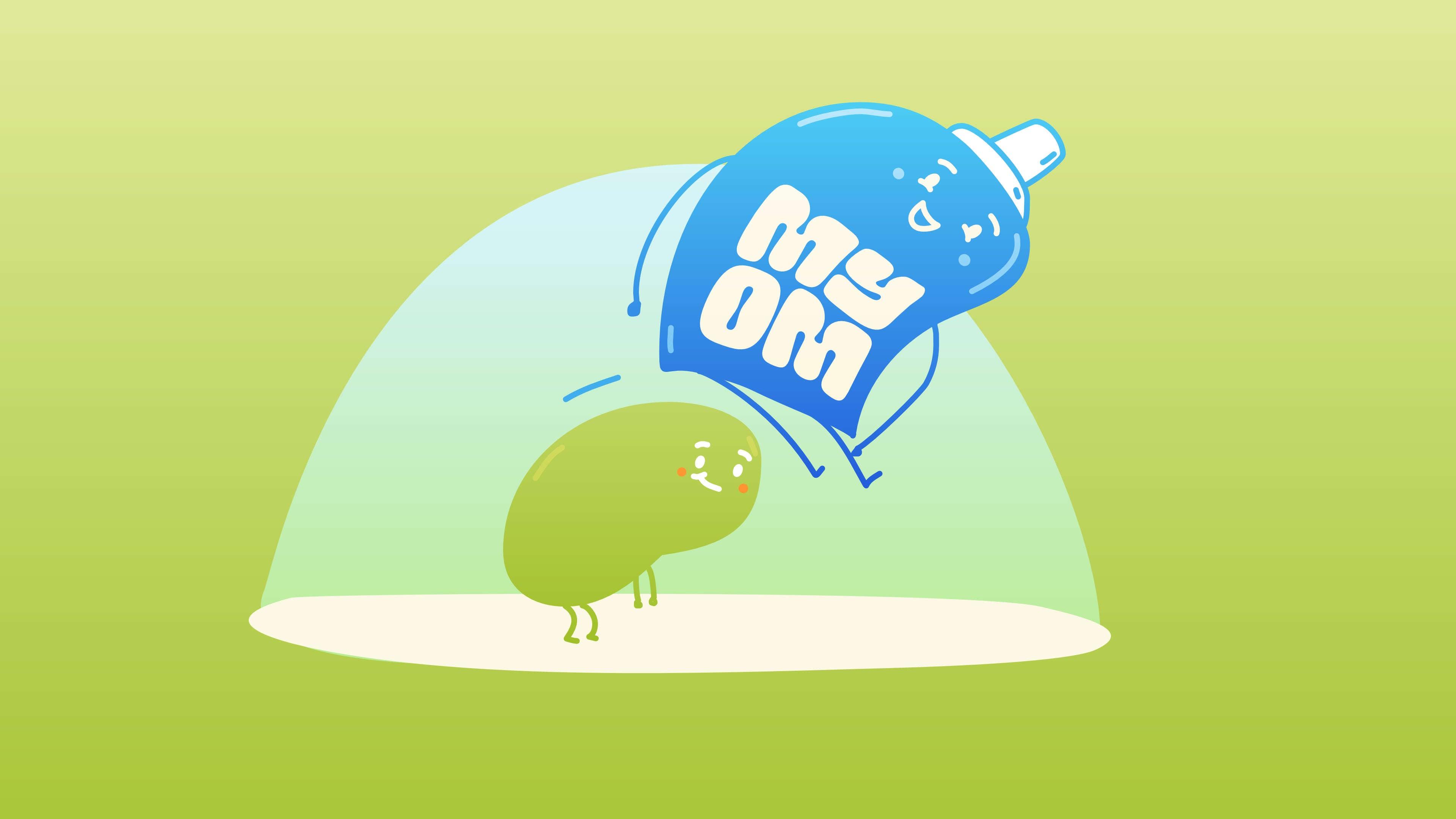The plant-based milk industry has grown tremendously in recent years, with greater variety and popularity of milk like oat milk appearing on shelves. There's a good reason for this rise – in the oat milk vs cow's milk battle, oat milk, like the one made with MYOM Original Oat Drink Blend, distinguishes itself in areas like nutritional content, environmental friendliness, and even taste.
Our deliciously thick oat milk premix is naturally lactose-free, making it suitable for those with lactose intolerance. It also tends to be lower in calories and fat compared to cow's milk, with 100ml of our Original Oat Drink containing just 34 kcal and 1.4g fat versus 46 kcal and 2g fat in semi-skimmed cow's milk. Additionally, MYOM is fortified with nutrients like calcium, vitamins D and B12, and iodine. These nutrients make oat milk a healthy, wholesome alternative.
Oat milk generally has a lower environmental impact, too. Producing cow's milk leads to deforestation for animal agriculture and methane emissions from cows. Comparatively, MYOM’s oat milk premix needs less water, land, and energy to make, reducing greenhouse gas emissions. We leave out the water completely, and you can simply mix our premix with water from your tap. Switching to our oat milk premix is an impactful, eco-friendly choice.
While the taste is subjective, many find oat milk made of our oat milk premix to have a creamy, neutral flavour that enhances foods and beverages like coffee. It froths well, too. Cow's milk has a cooling sensation, thicker consistency, and a distinctive dairy flavour that some dislike.
In this guide, we'll cover the key differences between oat and cow milk across nutrition, sustainability, and flavour to inform your choices.
Key Takeaways
- Oat milk made with our premix is a nutritious, eco-friendly alternative to cow's milk, lower in calories and fat, and fortified with essential nutrients like calcium, vitamins D, B12, and iodine.
- Cow's milk provides a naturally rich source of complete protein and essential nutrients but comes with a higher environmental impact due to significant water and land use, as well as methane emissions from cows.
- MYOM boasts a lower environmental footprint, with its premix form significantly reducing water usage and carbon emissions, making it a sustainable choice for conscious consumers.
- While taste is subjective, many find our Original Oat Drink Blend’s creamy, mildly sweet flavour versatile and suitable for various culinary uses, presenting an appealing alternative for those with dietary restrictions or preferences.
Oat Milk vs Cow Milk at a Glance
|
Aspect |
Oat Milk (MYOM Original Oat Drink Blend) |
Cow's Milk (Semi-skimmed) |
|
Nutritional Content |
||
|
Calories (per 100ml) |
34 kcal |
46 kcal |
|
Protein (per 100ml) |
0.4 grams (plant-based) |
3 grams |
|
Fat (per 100ml) |
1.4 grams, low in saturated fat (0.2 grams) |
2 grams, higher in saturated fat (1 gram) |
|
Calcium (per 100ml) |
130 mg (fortified) |
120 mg |
|
Other Nutrients |
Fortified with calcium, vitamins D, B12, iodine; contains dietary fibre and various minerals |
Naturally rich in vitamin D, calcium, potassium, B vitamins |
|
Environmental Impact |
||
|
Land Use |
Significantly lower use at 0.66m2/1l |
Requires more land for grazing and feed crops at 54m2/1l |
|
Water Use |
Low water use at 48.24l/1l oat milk. MYOM premix has no water added in production. |
Much higher at 628l/1l dairy milk |
|
Eutrophication |
85% less than dairy milk at 1.62g/1l oat milk |
Significantly higher harmful nutrient run-off at 10.62g/1l dairy milk |
|
Greenhouse Gas Emissions |
Significantly lower emissions. MYOM Premix further reduces carbon footprint by leaving water out of the process requiring less packaging, volume and weight in distribution. |
Roughly 3.15kg of CO2 per litre due to methane emissions from cows. |
|
Animal Welfare |
Cruelty-free, no animal exploitation or slaughter involved and completely suitable for vegans. |
Dairy production involves animal exploitation and potential slaughter. |
|
Taste and Usage |
||
|
Taste Profile |
Creamy, neutral, mildly sweet. Froths well. Suitable for coffee, baking, and as a dairy substitute. |
Thicker consistency, distinctive dairy flavour, cooling sensation. |
|
Dietary Suitability |
Suitable for vegans, vegetarians, and those with lactose intolerance or dairy allergies. |
Not suitable for vegans, vegetarians, or those with lactose intolerance or dairy allergies. |
Overview of Oat Milk vs Cow Milk
Oat and cow milk have unique nutritional profiles, environmental impacts, and tastes worth comparing. Evaluating them side-by-side across health benefits, sustainability, and sensory qualities helps match consumers with their values-based preferences.
Benefits of Oat Milk and Cow Milk
MYOM Oat Milk Benefits
MYOM oat milk does contain less protein than cow’s milk, with around 0.4 grams per 100ml versus 3 grams per 100ml in cow's milk. However, it still provides plant-based protein from its oat base.
Additionally, MYOM oat milk offers added essential nutrients like calcium, vitamin D, vitamin B12, and iodine at similar or greater levels than those found in cow's milk. For example, MYOM provides 130mg of calcium per 100ml, exceeding the 120mg in cow's milk, making it an excellent calcium source. This fortification makes MYOM nutritionally comparable to dairy milk.
Beyond nutrition, MYOM oat milk also delivers dietary advantages like lower sugar, fewer calories and less saturated fat - 34 kcal and 0.2 grams per 100ml versus 46 kcal and 1 gram in semi-skimmed cow's milk. Its light, mildly sweet taste suits many people who find dairy milk too heavy or rich as well.
Cow's Milk Benefits
Cow's milk earns its nutritional reputation thanks to ample protein, including all 9 essential amino acids, which MYOM lacks due to being plant-based. Cow's milk also contains excellent amounts of vitamin D, calcium, potassium and B vitamins naturally, providing complete nutrition to aid growth and development.
The nutritional profile of dairy milk better serves dietary needs dependent on complete, naturally occurring protein and nutrients. However, MYOM oat milk offers a healthy, sustainable fortified plant alternative aligned with restrictions around dairy.
So, while MYOM requires added nutrients, it provides sustainability and suits restricted diets better. Meanwhile, cow's milk delivers more complete plant nutrition that may be preferred depending on one's health priorities and needs.
Nutritional Content
When analysing the nutritional credentials of oat and cow milk, protein content and quality, vitamins and minerals, and overall dietary adequacy should be evaluated.
Oat Milk vs Cow Milk: Grams of Protein Content
Cow's milk naturally contains more protein per serving compared to MYOM oat milk. The main protein in cow milk comes from sources like casein and whey. In a 100 ml measurement, cow’s milk has around 3 grams of protein, while MYOM oat milk contains 0.4 grams. The protein in dairy milk also includes all nine essential amino acids needed for human health, something lacking in plant-based MYOM.
However, while lower, MYOM still provides protein from its oat base. With oat milk, protein arrives via oat bran, providing avenalin protein but not all essential amino acids. But for those with specific dietary restrictions or allergies, MYOM presents a useful plant-based, non-dairy alternative that delivers protein, even if in lesser amounts compared to cow’s milk without supplementation.
Cow milk is higher in complete protein essential for growth and development. But MYOM still offers plant-based protein in amounts commonly seen in non-dairy milk, aligning well with restricted diets.
Oat Milk vs Cow Milk: Essential Amino Acids
The nine essential amino acids comprise the protein-building blocks humans require from dietary sources. Cow milk contains all nine, while oat milk, like other plant milk, fails to offer a complete essential amino acid profile.
Without all nine essential amino acids present, the body struggles to utilise the protein absorbed. This makes cow milk superior in terms of usable protein quality. Those switching from cow to oat milk may need to supplement certain individual amino acids for optimal wellness.
Oat Milk vs Cow Milk: Nutritional Profile
When it comes to nutrients like protein, carbohydrates, fat and sugar, oat milk and cow's milk differ significantly, impacting their suitability for varying dietary needs.
MYOM oat milk premix contains less naturally occurring protein and calcium than cow’s milk. In a 100ml serving, MYOM provides 0.4 grams of protein and 130mg of calcium. Comparatively, cow's milk contains 3 grams of protein and 120 mg of calcium.
However, oat milk delivers advantages like fewer calories from fat, no cholesterol, and less saturated fat per 100ml serving. MYOM has 34 kcal, 0 g cholesterol and 0.2 g saturated fat, whereas semi-skimmed cow's milk has 46 kcal, 14 mg cholesterol and 1 g saturated fat.
MYOM oat milk premix also includes dietary fibre absent from cow’s milk and offers vitamin E, vitamin B12, iodine and various minerals. However, it does require added fortification to match some of cow milk’s higher naturally occurring amounts.
Therefore, those with lactose intolerance or seeking low-calorie, sustainable, or vegan-friendly options can benefit from MYOM’s nutritional profile. However, cow milk may better suit diets prioritising muscle gain, and adequate nutrition without supplementation.

Health Benefits
Both oat and cow milk offer unique health advantages, with suitability depending on one’s dietary needs and restrictions.
Oat Milk vs Cow Milk: Vegan Diet Benefits
For those following plant-based diets, oat milk that you get with our oozy premix offers a tasty alternative to cow milk without animal products or byproducts. With comparable creaminess and neutral flavour, MYOM oat milk mimics dairy while aligning with vegan lifestyles.
Vegans may need to intentionally supplement with certain vitamins, minerals and essential fatty acids when substituting cow milk for oat and other plant-derived milks. Check with a nutritionist to ensure optimal wellness.
Oat Milk vs Cow Milk: Source of Calcium for Vegetarians and Vegans
Vegans and vegetarians who omit dairy must seek calcium from plant-based sources. Both oat and cow milk offer calcium but in different forms and amounts.
Cow’s milk naturally provides a source of calcium, which is important for bone health. A 100ml serving contains around 120 mg calcium, which is 15% of one's recommended daily intake.
Oat milk can be calcium-fortified, but levels vary across brands. 100ml of MYOM Original Oat Drink Blend contains 130 mg of calcium, which equals 16% of the recommended daily intake. Without fortification, oat milk only provides 2-3% of recommended calcium intake.
Relying solely on unfortified oat milk risks inadequate calcium levels for those avoiding cow’s milk. Supplementation or intentional food choices may be required to support bone health. Consult an outpatient dietitian to ensure optimal intake.
Oat Milk vs Cow Milk: Non-Dairy Alternative That Is Healthier
Choosing the healthier non-dairy milk between oat and cow varieties depends greatly on one’s nutritional needs and diet goals.
MYOM oat milk premix offers advantages for restrictive diets like fewer calories, less fat, no cholesterol and lower sugar compared to dairy milk. Fortification also helps MYOM deliver calcium, vitamin D and vitamin B12 similar and in the case of calcium better than dairy’s nutritional profile.
Those avoiding dairy due to ethical or health reasons benefit from tasty plant-milk substitutes like oat milk. However, without careful dietary considerations, solely relying on oat milk risks nutritional deficiencies over time.
Consult a nutritionist if substituting cow’s milk to determine optimal supplementation and dietary adjustments specific to your needs.
Environmental Impacts
Dairy milk production carries enormous environmental consequences in areas like land and water use, carbon emissions and livestock practices. Evaluating the planetary impacts of dairy and plant milk informs earth-conscious consumer choices.
Oat Milk vs Cow Milk: Carbon Footprint Comparison
The carbon footprint and overall environmental impact of dairy milk significantly outpaces plant-based alternatives like oat milk.
Cows require vastly greater water and land resources for grazing and feed crop cultivation than oats and other grains. Their digestion also gives rise to potent greenhouse gas emissions dwarfing the carbon emissions of crop farming.
Every litre of cow milk produced results in roughly 17.6 pounds of carbon emissions. Compare that to just 0.7 pounds per gallon of oat milk, making dairy over 20 times more emissions-intensive. This demonstrates the drastically lighter environmental impact of the plant over animal milk varieties.
But even though the production of oat milk has a lower carbon footprint, the emissions are comparable to dairy milk when it comes to packaging and transportation. This is where MYOM Original Oat Milk premix comes out as a clear winner. We leave water out of our production. And when you get our premix, all you need to do is mix the premix and water from your tap in a bottle. It’s exactly this step that allows us to push down the carbon footprint of our Original Oat Drink Blend by as much as 90% compared to other plant-based milks.
Sustainable Production and Consumption Practices With Respect to Animal Welfare
Ethical dairy and meat production remains impossible, as these industries inherently violate animal rights through exploitation and slaughter once production efficiency declines.
However, steps like minimising beef sourced as a dairy byproduct could mitigate some dairy cattle suffering. Improving living conditions and slaughter standards may also lessen, though not eliminate, the ethical compromises underlying all animal agriculture.
For those prioritising environmental and animal welfare, substituting plant milk like oat milk offers the most ethical choice aligned with sustainable values.
Taste Oat Milk With MYOM
If exploring oat milk as a sustainable, nutritious alternative intrigues you, try MYOM Original Oat Drink Blend for a delicious and healthy option.
MYOM oat drink offers a mildly sweet, creamy taste resembling dairy that smoothly incorporates into any diet. Drink it straight, pour it over cereal, add it to smoothies, bake with it - the versatility suits every palate and cuisine.
Those new to plant milk will relish MYOM’s approachable flavour and texture, resembling the dairy milk many grew up on. Even coffee aficionados praise its foaming abilities and compatibility for brewing lattes or cappuccinosbat home.
Are you a retailer, or do you just want to ask a question? Get in touch with our team today and get started on your journey with MYOM.
We encourage you to embark on finding your perfect oat milk fit. With ethical, responsible production and award-winning taste, MYOM promises satisfying, sustainable plant-based milk for all lifestyles and values.
FAQs
Is oat milk better for you than cow's milk?
In some respects, yes. Oat milk is lower in calories, fat, sugar and cholesterol than whole cow’s milk. For those monitoring weight, heart health or managing conditions like diabetes, our oat milk premix offers advantages. However, cow’s milk contains more complete, naturally occurring protein. Supplementation may be necessary when substituting with oat milk.
Is there a downside to oat milk?
If not fortified, oat milk lacks sufficient protein, calcium, vitamin D and other nutrients absent in plants that cow’s milk reliably provides. Relying solely on non-fortified oat milk risks nutritional deficiencies over time if the diet is not supplemented to compensate.
MYOM oat milk premix has advantages like fewer calories, less fat, no cholesterol and lower sugar compared to dairy milk. Fortification also helps MYOM deliver calcium, vitamin D and vitamin B12 similar to or better than dairy’s nutritional profile.
What is the healthiest milk to drink?
The “healthiest” milk depends entirely on your individual nutritional needs and diet goals or restrictions. For vegans and vegetarians, fortified plant milk like MYOM oat milk presents a healthy option. However, for some, cow’s milk may remain the best guarantee of sufficient protein, calcium and vitamins.
Why replace cow's milk with oat milk?
Reasons for substituting cow's milk largely stem from environmental, ethical and health factors. Oat milk offers a more eco-friendly, cruelty-free milk alternative that may also benefit those managing weight, cholesterol or conditions like lactose intolerance. Taste preferences also lead consumers toward plant-based milk varieties.
Learn More About MYOM
Now that you know how oat milk, and specifically MYOM’s oat milk premix, differ from cow’s milk, are you tempted to give it a go? Here are further resources with more information:
- Original Oat Drink | Best Tasting Vegan Oat Milk | MYOM - Are you set on giving MYOM a go? Buy your oat milk premix here.
- FAQs: Your Guide to Preparation, Nutrition & Sustainability (myom.shop) - It’s only natural that you have more questions. Luckily, we have the answers to anything you want to know, from nutrition to the sustainability of MYOM.
- Are Cows Bad For The Environment? [ A CLOSER LOOK ] MYOM - Do you want to dive deeper into the environmental aspect of milk? Let’s explore if cows really are bad for the environment.
Other sources:
- Dairy vs. plant-based milk: what are the environmental impacts? Published on Our World in Data by Hannah Ritchie January 19, 2022.
- Poore, J., & Nemecek, T. (2018). Reducing food’s environmental impacts through producers and consumers. Science, 360(6392), 987-992.
FAOstat: UN Food and Agriculture Organization (FAO) Statistics. Available at: http://www.fao.org/faostat/en/#data. - https://ourworldindata.org/faqs-environmental-impacts-food Published on Our World in Data by Hannah Ritchie 7 February 2022.




